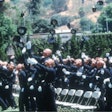In my travels, I 've seen the acronym "S.P.E.A.K. U.P." on the wall of hospitals, regarding patients' rights. I once saw it at a university advocating student rights. I liked it and wrote it down. It's now time to use it for Rookies' Rights!
You may wonder What you're entitled to during the field training officer (FTO) process? Let's go over this now.
S: Speak up — You've been trained; your interaction with your field training officer (FTO) is instrumental in completing this process. Don''t be afraid to speak to them; they're there for you. In matters of safety, you must speak up; your eyes may detect a safety issue that could prevent injury or death. Speak up when it comes to your progress and evaluations. If you don't understand a concept today, it'll be more difficult later. This is a building-block process.
P: Pay attention — There's a lot unfolding in front of you. Observe, rather than just looking. You may only get one training opportunity to view this type of event in a lifetime. You have got to have your "A" game at all times. Observe and attempt to perceive what's transpiring, a causal glance can be a lost moment. Tactically, you must always pay attention, because it's a safety factor. Stay alert!
E: Educate — The academy experience is never over. You'll be training the rest of your life, so get used to it. Additionally, if you don't have your college degree, finish it off. Education is something nobody can take from you, besides it will help you get promotions later. Finally, treat every day as a new learning experience. The day you stop learning, please turn in your shield.
A: Ask — The old maxim that there are no stupid questions applies here! If you don't understand, ask questions! Your silence may give the impression of understanding, and you could be tasked or stressed with a more intense assignment. Ask about the FTO process, and cover other fronts. How do you conduct yourself off-duty (external behavior)? How do you get along with shift co-workers (internal behavior)? Ask your FTO to teach you how to survive on the streets.
K: Know — Know your rights as an employee. You may be the FNG (fabulous new guy), but that doesn't mean you deserve to be treated as a second-class citizen. Know your employee benefits; ask for all the benefit explanations. Finally, know your job. You have to exhibit proficiency with the policies and procedures. Study and apply yourself.
U: Use your department's systems — Every agency has employee resources in place. Read your benefit sheets, and familiarize yourself with them. Do you have a credit union, payroll savings plan, chaplains, and so forth. Fully understand your health insurance as well; learn to use it wisely. Maximize your savings. I never understood why some officers never planned for the future. Understand your support system formally and informally. Your FTO will help you. Later on, new police pals will offer help. This is a tough vocation. Talk to your buddies, and keep yourself on an even keel.
P: Participate in decision making — Don't be a passive learner or employee. Share your insights and strengths. Some training programs require your input to determine their direction. You've brought a lot of life skills to the table; use them. When it comes to your future training, don't wait for a class. Make solid career decisions, thinking about your best interest.
"S.P.E.A.K. U.P." is a good acronym for a recruit. Training is hard work, but it pays off in the long run.


















